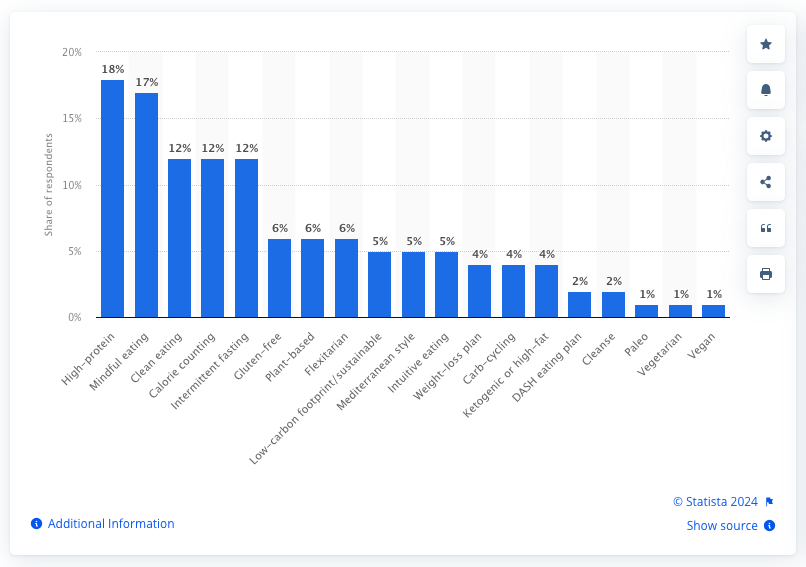Mastering Your Plate: Understanding and Cultivating Healthy Dietary Habits
Welcome to “Mastering Your Plate,” a comprehensive guide to understanding and cultivating healthy Food habits. In today’s fast-paced world, where convenience often trumps nutrition, it’s more important than ever to take charge of our eating habits and prioritize our health. In this blog, we’ll delve into the science behind dietary habits, explore their impact on overall health and well-being, and provide practical tips for mastering your plate and nourishing your body for optimal vitality.
Share of diet type followed by Americans 2023
Understanding Dietary Habits:
Diet habits encompass the behaviors and choices related to food intake, including what, when, and how much we eat. These habits are influenced by a myriad of factors, including cultural traditions, socioeconomic status, personal preferences, and environmental cues. According to a study published in the British Journal of Nutrition, habits play a significant role in shaping dietary patterns, with repeated behaviors becoming automatic and ingrained over time.
The Impact of Dietary Habits on Health:
Our dietary habits have a profound impact on our health and well-being, influencing risk factors for chronic diseases such as obesity, diabetes, cardiovascular disease, and certain cancers. Research published in the Lancet highlights the role of poor dietary habits, including excessive consumption of ultra-processed foods, in driving the global obesity epidemic. Conversely, adopting healthy dietary habits, such as eating a balanced diet rich in fruits, vegetables, whole grains, and lean proteins, is associated with reduced disease risk and improved longevity.
Factors Influencing Dietary Habits:
Several factors influence our dietary habits, shaping our food choices and eating behaviors. These factors include:
- Social and Cultural Influences: Cultural norms, family traditions, peer influences, and social gatherings all impact our dietary habits. For example, cultural celebrations often involve specific foods and culinary customs that influence our eating behaviors.
- Environmental Cues: Environmental factors such as food availability, accessibility, and marketing strategies influence our food choices. Research published in Appetite suggests that the presence of unhealthy food cues, such as advertisements and food displays, can trigger impulsive eating behaviors.
- Psychological and Emotional Factors: Our emotional state, stress levels, and psychological well-being can affect our dietary habits. Emotional eating, characterized by the consumption of food in response to emotional cues rather than hunger, is a common phenomenon that can lead to unhealthy eating patterns.
Cultivating Healthy Dietary Habits:
Developing healthy dietary habits requires a combination of knowledge, mindfulness, and practical strategies. Here are some tips for cultivating healthy eating habits:
- Eat Mindfully: Pay attention to your body’s hunger and fullness cues, and savor each bite of food. Avoid distractions such as screens or multitasking while eating, and focus on the sensory experience of eating.
- Plan and Prepare Meals: Take the time to plan and prepare balanced meals ahead of time, incorporating a variety of nutrient-rich foods. Batch cooking and meal prepping can help streamline your meal preparation process and ensure that healthy options are readily available.
- Practice Portion Control: Be mindful of portion sizes and avoid oversized servings, especially when dining out or eating packaged foods. Use smaller plates and bowls to help control portion sizes and prevent overeating.
- Stay Hydrated: Drink plenty of water throughout the day to stay hydrated and support overall health. Limit sugary beverages and opt for water, herbal tea, or infused water as refreshing alternatives.
- Seek Support: Surround yourself with a supportive network of friends, family, or online communities who share your health and wellness goals. Accountability partners can provide encouragement, motivation, and practical tips for maintaining healthy dietary habits.
Conclusion:
In conclusion, mastering your plate and cultivating healthy dietary habits are essential steps towards achieving optimal health and well-being. By understanding the science behind dietary habits, recognizing their impact on health, and implementing practical strategies for improvement, you can take control of your eating behaviors and nourish your body with the nutrients it needs to thrive. Remember, small changes can lead to significant improvements over time, so start incorporating healthier habits into your daily routine today.
We tried to cover Balanced Meals in our previous chapters, you can get an overview of what balanced meals you can try.
Here are some statistics and data to support the points made in the blog, along with links to the sources for further reading:
Impact of Poor Dietary Habits on Obesity:
According to a study published in The Lancet, poor dietary habits, including the consumption of ultra-processed foods high in sugar, salt, and unhealthy fats, are major contributors to the global obesity epidemic.
Role of Healthy Dietary Habits in Reducing Disease Risk:
Research published in the American Journal of Clinical Nutrition suggests that adopting healthy dietary habits, such as consuming a balanced diet rich in fruits, vegetables, whole grains, and lean proteins, is associated with a reduced risk of chronic diseases such as cardiovascular disease, type 2 diabetes, and certain cancers.
Environmental Influences on Dietary Habits:
A study published in the journal Appetite found that environmental cues, such as the presence of advertisements and food displays, can influence food choices and eating behaviors, potentially leading to unhealthy dietary habits. (Source)
Psychological Factors and Emotional Eating:
Research published in the International Journal of Behavioral Nutrition and Physical Activity highlights the role of psychological factors, stress levels, and emotional well-being in shaping dietary habits, including the phenomenon of emotional eating.
Benefits of Mindful Eating:
Studies have shown that practicing mindful eating, which involves paying attention to hunger and fullness cues and savoring each bite of food, can lead to improved eating behaviors and better overall health outcomes. (Source)
Importance of Support Networks:
According to research published in the Journal of Medical Internet Research, having a supportive network of friends, family, or online communities can positively influence dietary habits and adherence to healthy eating behaviors.
These statistics provide valuable insights into the impact of dietary habits on health and well-being, as well as practical strategies for cultivating healthier eating behaviors. Feel free to explore the provided sources for more in-depth information on each topic.


